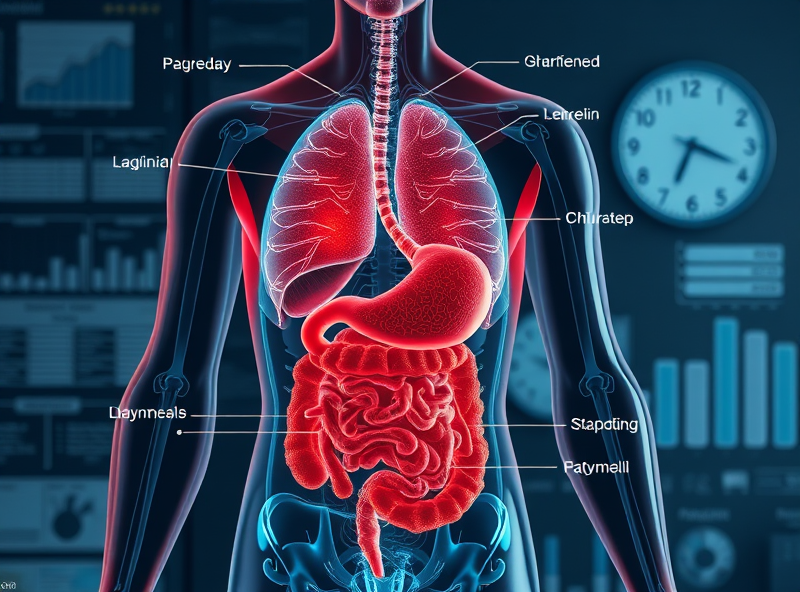
Effective Strategies to Overcome Diet Failure: Causes and Solutions
Physiological Factors in Diet Failure

When it comes to diet failure, physiological factors often play a significant role. Many people blame their lack of willpower, but the truth is, your body’s internal systems can sometimes work against your dieting efforts. For instance, hormones like ghrelin (the hunger hormone) and leptin (the satiety hormone) can become imbalanced during calorie restriction, leading to increased hunger and decreased feelings of fullness. Additionally, metabolic adaptation—where your body slows down its metabolism in response to reduced calorie intake—can make it harder to lose weight over time.
Another key factor is blood sugar regulation. If your diet lacks balanced nutrients, such as protein, healthy fats, and fiber, you may experience blood sugar spikes and crashes, which can lead to cravings and overeating. Sleep deprivation is another physiological factor that can disrupt your diet. Poor sleep can increase levels of cortisol, a stress hormone that promotes fat storage, and can also impair your decision-making, making it harder to stick to healthy food choices.
Understanding these physiological challenges is the first step toward overcoming them. Focus on creating a sustainable diet plan that includes nutrient-dense foods, prioritize quality sleep, and listen to your body’s hunger and fullness cues. Remember, it’s not just about willpower—it’s about working with your body, not against it.
Psychological Challenges in Dieting

Dieting is not just about what you eat; it’s also about how you think and feel. Many people struggle with dieting because of psychological challenges that often go unnoticed. For instance, emotional eating is a common issue where individuals turn to food for comfort during stress, sadness, or boredom. This behavior can sabotage even the most well-planned diets. Another challenge is the all-or-nothing mindset, where one small slip-up leads to feelings of failure and the abandonment of the entire diet plan.
To overcome these challenges, it’s important to cultivate self-awareness. Start by identifying emotional triggers that lead to overeating and find healthier ways to cope, such as journaling, meditating, or talking to a friend. Additionally, practice self-compassion. Remember, no one is perfect, and a single mistake doesn’t define your journey. Instead of giving up, refocus on your goals and take small, manageable steps forward. Building a positive relationship with food and understanding your emotions can make a significant difference in achieving long-term success in dieting.
Methodological Mistakes and How to Fix Them

When it comes to dieting, many people unknowingly set themselves up for failure by making common methodological mistakes. One of the most frequent errors is adopting overly restrictive diets. While it might seem like cutting out entire food groups or drastically reducing calorie intake will lead to quick results, this approach often backfires. Extreme restrictions can cause feelings of deprivation, leading to binge eating or abandoning the diet altogether. Instead, focus on creating a balanced meal plan that includes all food groups in moderation. This way, you’re more likely to stick to your diet long-term.
Another common mistake is setting unrealistic goals. For example, aiming to lose 10 pounds in a week can be discouraging if you don’t see immediate results. Instead, set achievable and measurable goals, such as losing 1-2 pounds per week, which is a healthy and sustainable rate. Celebrate small victories along the way to stay motivated.
Lastly, many people fail to track their progress effectively. Without monitoring what you eat or how much you exercise, it’s easy to lose sight of your goals. Consider using a food diary or a mobile app to keep track of your meals, exercise, and even your emotions around eating. This can help you identify patterns and make adjustments as needed. By addressing these methodological mistakes, you can create a more sustainable and successful approach to dieting.
Practical Solutions for Sustainable Weight Loss

Sustainable weight loss is not about quick fixes or extreme diets; it’s about creating a lifestyle that supports your long-term health and well-being. Here are some practical solutions to help you achieve your goals:
1. **Focus on Balanced Nutrition**: Instead of eliminating entire food groups, aim for a balanced diet that includes lean proteins, whole grains, healthy fats, and plenty of fruits and vegetables. This ensures your body gets the nutrients it needs to function optimally.
2. **Set Realistic Goals**: Start with small, achievable goals rather than aiming for drastic weight loss. For example, aim to lose 1-2 pounds per week, which is considered a healthy and sustainable rate.
3. **Practice Mindful Eating**: Pay attention to your hunger and fullness cues. Avoid distractions like TV or smartphones during meals, and savor each bite to prevent overeating.
4. **Incorporate Regular Exercise**: Physical activity is a key component of sustainable weight loss. Find an activity you enjoy, whether it’s walking, swimming, dancing, or yoga, and aim for at least 150 minutes of moderate exercise per week.
5. **Prioritize Sleep and Stress Management**: Lack of sleep and high stress levels can disrupt hormones that regulate hunger and metabolism. Aim for 7-9 hours of quality sleep per night and practice stress-reducing activities like meditation or deep breathing.
6. **Track Your Progress**: Keep a journal or use a mobile app to track your meals, exercise, and progress. This can help you stay accountable and identify patterns that may need adjustment.
Remember, the journey to sustainable weight loss is a marathon, not a sprint. Be kind to yourself, celebrate small victories, and focus on building habits that support your overall health and happiness.




